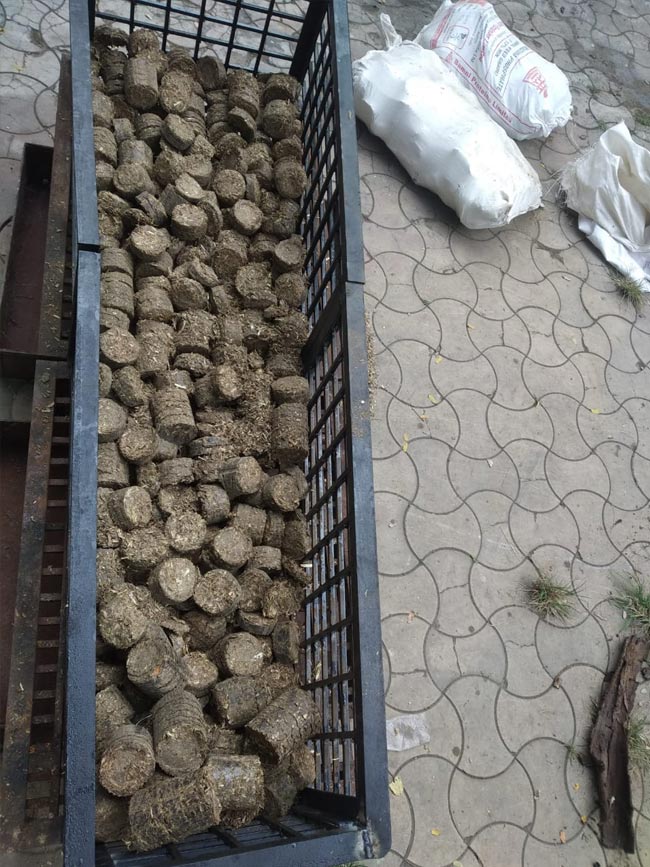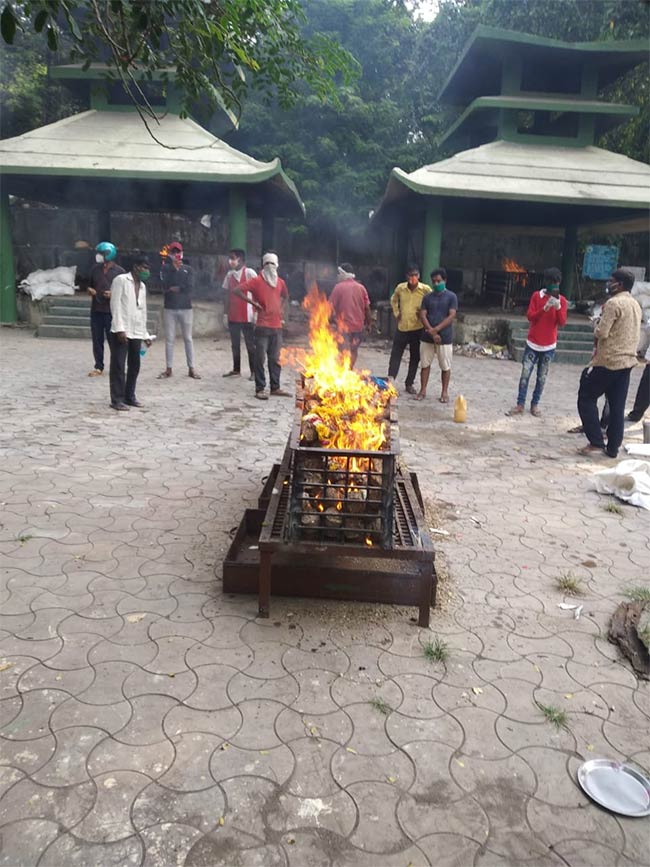Highlights
- Mr Limaye first introduced cow dung cakes as an alternative to wooden logs
- The supply of dung cakes couldn’t meet the demand and lead to a price hike
- In 2016, Mr Limaye presented Moksha Kashtha briquettes made from agro-waste
New Delhi: “If you have never planted even a single tree in your entire life, you don’t have a right to cut a tree for the cremation. It’s like spending money without earning it”, explains 52-year-old Vijay Limaye from Nagpur who is asking people to replace wood logs with briquettes made using agricultural waste for cremation. In conversation with NDTV, Mr Limaye said that a traditional Hindu cremation involves a funeral pyre built using around 350kgs of wood. For each cremation, two 15-year-old native trees are cut. He added, “According to a research I did a year and a half ago, 1.6 crore trees are cut every year for cremation. Most of the trees chopped to fulfill the demand for fresh wood for cremation are native from the Indian Peninsula. These are mainly Mango, Neem, Banyan, and Peepal trees and are expected to live up to 400-500 years. Unfortunately, these trees are cut at a tender age of 15-20 years. This way, we are depleting our green belt.”
The concept of cutting trees for cremation hit him when tragedy struck home and Mr Limaye’s father passed away. In 2010, after performing a traditional Hindu ceremony of last rites for his father, Mr Limaye was left feeling with a sense of guilt for having opted for wood for cremation and contributing to the felling trees .
Following this, Mr Limaye, an insurance surveyor and loss assessor, started looking for different methods of cremation. While travelling and visiting one crematorium after another, Mr Limaye discovered a common yet less explored method of cremation – using cow dung cakes. He said,
In villages near Nagpur and Chingwada area, whenever someone dies, every household gives around 50 cow dung cakes to the family of the late person. It is considered as a last gift to the dead. The cow dung cakes are used in the cremation process.
Mr Limaye liked the concept and found dung cakes as a viable alternative to wood logs and decided to promote the same in Nagpur city. With the help of Nagpur Municipal Corporation (NMC), Mr Limaye initiated a pilot project at one of the 14 crematoriums in the city and started promoting the use of dung cakes.
People who own cows and buffaloes got employment because of our initiative and everything was going well until the demand exceeded supply and in turn affected the price. People who would give dung cakes for Rs.1 per piece soon started demanding Rs.5 per piece because of which the overall cost of cremation increased from Rs.4,000 to Rs.10,000. Secondly, we realised that collecting cow dung and preparing dung cakes was a task during the rainy season. In the long run, we would not be able to meet the demand, said Mr Limaye.
Green warrior’s quest to find an eco-friendly and affordable alternative to traditional cremation came back to where it started from. While passing an agricultural field, Mr Limaye saw heaps of crop residues being burnt. He recalled,
Stubble burning is not a problem of Punjab and Haryana alone. It makes news because it adds to the air pollution of Delhi. However, the practice of burning agricultural waste is prevalent across India.
When Mr Limaye saw agricultural waste on fire, he decided to utilise it for the cremation. He purchased it from farmers and started experimenting with waste to prepare prototypes for cremation. Explaining the process and journey to finding the perfect alternative to wooden logs, he said,
I started spending hours at crematoriums, noting how much time it takes for a body to burn down completely (generally, three hours). I had to build something that could burn for at least three hours. Every now and then I would convince a family to use biomass briquettes for cremation and see how it works. Sometimes, the trial would give 60 per cent result and sometimes 80 per cent. After varied permutations and combinations and nine trials, I got success. In 2016, the tenth cremation that was done with ‘Moksha Kashtha’ (wood for salvation) briquettes was 100 per cent successful.
Mr Limaye now purchases agricultural waste from farmers, which is then chopped into small pieces of 5mm and compressed in a machine to make cylindrical blocks. The briquettes are prepared using bagasse, soybean waste, cotton stock, and saw dust.
Explaining how using agricultural waste solves the problem of air pollution and save trees from getting axed, Mr Limaye said,
Crop residue is burnt anyway. But by replacing it with wood logs, we are burning one less item which means less pollution. In addition to this, around 250 kg of briquettes is required as compared to 350 kgs of wood logs used in each cremation. Also, the cost of eco-friendly cremation is 20 per cent less than the traditional method (Rs.2,700 to Rs.3,000).
Since 2016, six crematoriums in Nagpur city are using ‘Moksha Kashtha’ briquettes for cremating 500 bodies every month. In the last four years, Mr Limaye and team have saved over 50,000 trees and now plan to expand the initiative to other crematoriums in the city.
Nagpur is one of the cities in Maharashtra where the municipal corporation bears the cost of wood required in each cremation. When Mr Limaye introduced the concept of eco-friendly wooden logs, the municipal corporation extended full financial support. Talking about Mr Limaye’s idea and what motivated the government to support him, Dr Gajendra Mahalle from the Solid Waste Management department of Nagpur Municipal Corporation said,
We liked the idea of not cutting trees and using agricultural waste without compromising with the process. By supporting him, we are also doing our bit in protecting the environment. To promote the use of briquettes at six of the crematoriums, we have told the citizens that while briquettes will be provided for free, we will charge for wood based cremation.
Talking about how he convinced the government and people to opt for briquettes, Mr Limaye said, the citizens knew about his initial experiment with cow dung cakes. Also, people prefer pyre over electric or gas cremation and briquettes help in keeping that process intact. Apart from this, he would reiterate his thought, ‘if you have not planted trees then you don’t have a right to axe them’.
NDTV – Dettol Banega Swasth India campaign is an extension of the five-year-old Banega Swachh India initiative helmed by Campaign Ambassador Amitabh Bachchan. It aims to spread awareness about critical health issues facing the country. In wake of the current COVID-19 pandemic, the need for WASH (Water, Sanitation and Hygiene) is reaffirmed as handwashing is one of the ways to prevent Coronavirus infection and other diseases. The campaign highlights the importance of nutrition and healthcare for women and children to prevent maternal and child mortality, fight malnutrition, stunting, wasting, anaemia and disease prevention through vaccines. Importance of programmes like Public Distribution System (PDS), Mid-day Meal Scheme, POSHAN Abhiyan and the role of Aganwadis and ASHA workers are also covered. Only a Swachh or clean India where toilets are used and open defecation free (ODF) status achieved as part of the Swachh Bharat Abhiyan launched by Prime Minister Narendra Modi in 2014, can eradicate diseases like diahorrea and become a Swasth or healthy India. The campaign will continue to cover issues like air pollution, waste management, plastic ban, manual scavenging and sanitation workers and menstrual hygiene.
[corona_data_new]






























